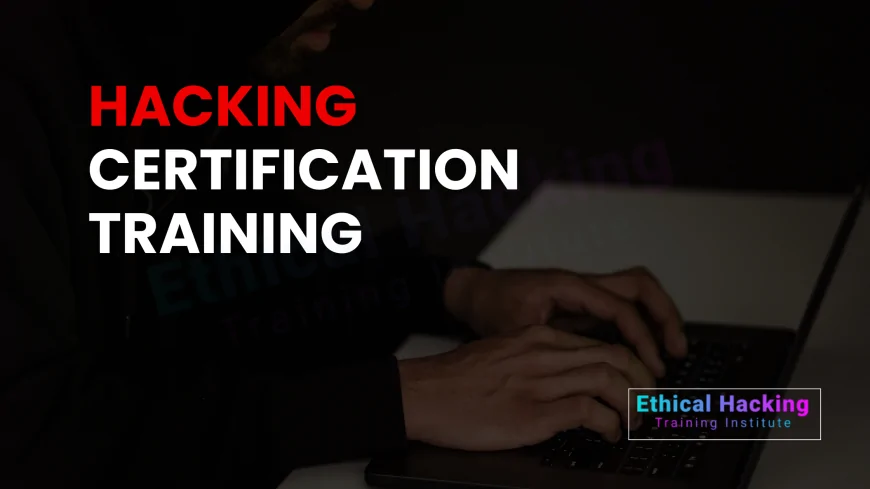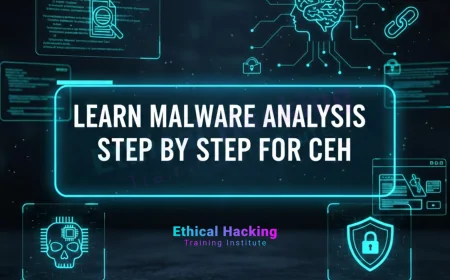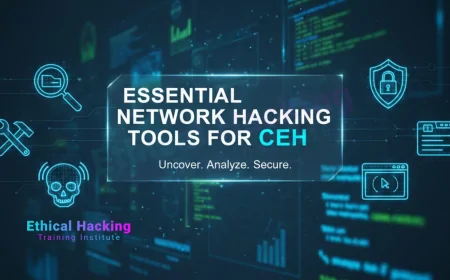Hacking Certification Training Centers in Pune | Ethical Hacking Courses with Placement Assistance
Explore top ethical hacking certification training centers in Pune. Learn penetration testing, ethical hacking tools, and real-world cybersecurity techniques. Get certified and secure a high-paying job.

With cyber threats evolving rapidly, the demand for ethical hackers and cybersecurity professionals has skyrocketed. Pune, known for its IT and education hub, hosts several hacking certification training centers that offer hands-on courses designed for students, IT professionals, and aspiring cybersecurity experts. These centers provide globally recognized certifications, real-time lab access, and placement assistance to help you launch a career in ethical hacking.
Why Choose Hacking Training in Pune?
Pune is a top choice for cybersecurity training due to:
-
Proximity to major IT companies and startups.
-
Affordable, high-quality education with hands-on labs.
-
Access to industry-expert trainers.
-
Courses aligned with global standards like CEH (Certified Ethical Hacker) and CPENT.
Whether you're a beginner or an IT professional looking to upskill, Pune’s training centers offer programs tailored to your career goals.
What Is Ethical Hacking?
Ethical hacking involves legally probing networks, systems, or applications to identify security flaws before malicious hackers can exploit them. Certified ethical hackers are trained to think like attackers but act as defenders, helping organizations protect their digital assets.
Key concepts include:
-
Penetration testing
-
Vulnerability assessment
-
Network and system security
-
Social engineering
-
Malware analysis
Top Certifications Offered
Hacking training centers in Pune typically prepare you for the following global certifications:
| Certification | Description | Level |
|---|---|---|
| CEH (v13) | Certified Ethical Hacker, industry standard | Intermediate |
| CPENT | Certified Penetration Testing Professional | Advanced |
| CHFI | Computer Hacking Forensic Investigator | Forensic Expert |
| CND | Certified Network Defender | Beginner to Pro |
| Bug Bounty Training | Real-world vulnerability discovery and reporting | Intermediate |
| VAPT Training | In-depth Vulnerability Assessment and Penetration Testing | Intermediate |
Key Features of Ethical Hacking Courses in Pune
Most certified hacking courses in Pune include:
-
Live Instructor-led Training
-
Access to Real-time Hacking Labs
-
Tools like Kali Linux, Burp Suite, Metasploit
-
Mock Interviews & Resume Building
-
Job Assistance or Internship Support
-
Flexible Weekend and Weekday Batches
-
Certifications Aligned with EC-Council Standards
Who Should Enroll?
These training programs are ideal for:
-
IT graduates and engineers
-
Network administrators
-
Cybersecurity enthusiasts
-
Freelancers and bug bounty hunters
-
Law enforcement professionals
-
Beginners with interest in ethical hacking
No prior coding experience? Don’t worry—most courses start with the fundamentals and gradually introduce you to advanced topics.
What Will You Learn?
Hacking certification courses cover:
-
Networking & Security Fundamentals
-
Footprinting & Reconnaissance
-
Scanning Networks & Systems
-
System Hacking & Privilege Escalation
-
Web Application Attacks (SQLi, XSS, CSRF)
-
Wi-Fi Hacking & Mobile Security
-
Cryptography & Password Cracking
-
Social Engineering Attacks
-
Real-time Penetration Testing Labs
-
Introduction to Bug Bounty Platforms
Benefits of Getting Certified in Ethical Hacking
-
Globally recognized certification (CEH, CPENT)
-
Higher salary prospects and job opportunities
-
Freelance and remote work options
-
Cybersecurity job roles across industries
-
Build your reputation as a white-hat hacker
-
Eligibility for SOC Analyst, Pen Tester, Security Consultant, etc.
Placement and Internship Support
Reputed centers in Pune assist students with:
-
Resume building and interview preparation
-
Internship opportunities with cybersecurity firms
-
1-on-1 mentorship from ethical hackers
-
Access to a job portal or placement drive
Many students land jobs in Pune’s booming tech companies or start freelancing in penetration testing and bug bounty.
Fee Structure for Ethical Hacking Courses in Pune
| Course | Duration | Estimated Fee |
|---|---|---|
| CEH Certification | 2–3 Months | ₹30,000 – ₹45,000 |
| CPENT Training | 2–3 Months | ₹45,000 – ₹60,000 |
| Bug Bounty Course | 1–2 Months | ₹20,000 – ₹35,000 |
| VAPT Specialization | 1 Month | ₹15,000 – ₹30,000 |
| Full Ethical Hacking Suite | 4–6 Months | ₹50,000 – ₹70,000 |
Note: Prices vary depending on the course provider, batch type, and additional lab access.
Career Opportunities After Certification
Certified ethical hackers can apply for:
-
Cybersecurity Analyst
-
Penetration Tester
-
Bug Bounty Hunter
-
SOC Analyst (Security Operations Center)
-
VAPT Consultant
-
Security Engineer
-
Information Security Analyst
Entry-level salaries range from ₹4–6 LPA, while skilled professionals can earn ₹10–20 LPA or more.
Conclusion
If you're serious about a cybersecurity career, enrolling in a hacking certification training center in Pune is a smart move. These courses offer industry-relevant training, real-world labs, and certifications that open doors to top job roles. Whether you aim to be a white-hat hacker, bug bounty expert, or cybercrime investigator, Pune has the right learning environment and support system to help you succeed.
FAQs:
What is ethical hacking?
Ethical hacking is the authorized process of identifying vulnerabilities in systems and networks to prevent cyber attacks. It involves using hacking techniques to secure systems and protect them from malicious hackers.
Who should enroll in an ethical hacking course?
Anyone interested in cybersecurity, IT professionals, network administrators, students, or those looking to transition into cybersecurity can benefit from an ethical hacking course.
What is the certification process in ethical hacking?
The certification process typically includes completing the training program, passing an exam, and demonstrating hands-on skills through labs or a final project. Certifications like CEH or CPENT are globally recognized.
How long does it take to complete the ethical hacking course?
The course duration usually ranges from 2 to 6 months, depending on the depth of the training and whether it is part-time or full-time.
What are the prerequisites for the ethical hacking course?
Basic knowledge of networking, operating systems, and computer systems is recommended. However, many courses also cater to beginners with no prior knowledge of ethical hacking.
Which are the best ethical hacking certifications?
Some of the best certifications in ethical hacking are CEH (Certified Ethical Hacker), CPENT (Certified Penetration Testing Expert), CHFI (Computer Hacking Forensic Investigator), and OSCP (Offensive Security Certified Professional).
Is ethical hacking legal?
Yes, ethical hacking is legal when done with proper authorization to identify vulnerabilities in systems. It is conducted by certified professionals to help organizations improve security.
Can I freelance after completing an ethical hacking course?
Yes, you can freelance as a penetration tester, bug bounty hunter, or cybersecurity consultant after gaining experience and building a portfolio.
Is placement assistance provided after the course?
Most reputed ethical hacking centers offer placement assistance, including job preparation, interview coaching, and access to job portals to help you secure a role in cybersecurity.
What are the job opportunities after completing an ethical hacking course?
After completing the course, you can apply for roles like Penetration Tester, Security Analyst, Vulnerability Assessment Engineer, Network Security Engineer, and Bug Bounty Hunter.
What salary can I expect after completing an ethical hacking course?
Entry-level ethical hackers can earn between ₹4-6 LPA, while experienced professionals can earn ₹10-20 LPA or more, depending on their expertise and industry demand.
What tools are taught in ethical hacking courses?
Some of the most commonly taught tools in ethical hacking courses include Kali Linux, Metasploit, Wireshark, Burp Suite, Nmap, and Netcat.
What is penetration testing?
Penetration testing, or ethical hacking, involves simulating cyberattacks on a system or network to identify vulnerabilities that could be exploited by malicious hackers.
What are some of the top ethical hacking tools?
Top ethical hacking tools include Nmap (for network scanning), Metasploit (for exploiting vulnerabilities), Wireshark (for network traffic analysis), and Burp Suite (for web application testing).
Is coding required for ethical hacking?
While coding skills are not mandatory for beginners, knowledge of scripting languages such as Python, Bash, or Perl can be beneficial for advanced penetration testing tasks.
Are ethical hacking courses practical or theoretical?
Most ethical hacking courses include a practical, hands-on component where students use tools and techniques in real-world labs to understand how ethical hacking is done.
Do ethical hacking courses include live projects?
Yes, many courses offer live or simulated projects where students can practice penetration testing on real systems, enhancing their skills.
Can I become a cybersecurity consultant after this course?
Yes, after completing an ethical hacking course and gaining experience, you can work as a cybersecurity consultant, providing organizations with guidance on how to protect their systems from cyber threats.
What is the difference between ethical hacking and white-hat hacking?
There is no difference—ethical hacking and white-hat hacking refer to the same practice of legally testing systems for vulnerabilities to protect them.
Are there any prerequisites for the advanced ethical hacking course?
For advanced courses, it is recommended to have a foundational understanding of networking, operating systems, and basic penetration testing.
Can ethical hacking help in preventing cyberattacks?
Yes, ethical hacking helps organizations identify and fix vulnerabilities before they can be exploited by malicious hackers, thus preventing potential cyberattacks.
What databases are used in ethical hacking training?
Training often involves working with databases like MySQL, MongoDB, PostgreSQL, and SQL Server as part of web application and network penetration testing.
Can I access the course materials after completing the course?
Yes, many ethical hacking centers provide lifetime access to course materials, videos, and lab setups for continued learning and reference.
How can I improve my ethical hacking skills after completing the course?
You can improve your skills by participating in Capture The Flag (CTF) challenges, bug bounty programs, attending workshops, and keeping up with cybersecurity news.
Are online ethical hacking courses available?
Yes, many centers offer online courses with flexible timings for students who cannot attend in-person training.
What is the difference between ethical hacking and black-hat hacking?
Ethical hacking is done legally and with permission to improve system security, while black-hat hacking is malicious hacking for personal gain or to cause harm.
What is the significance of OSCP certification?
OSCP (Offensive Security Certified Professional) is a widely respected certification for penetration testers, demonstrating hands-on skills in real-world hacking scenarios.
Do ethical hackers need to learn networking?
Yes, networking is a key component of ethical hacking. Understanding protocols, IP addresses, and how networks operate is essential for effective penetration testing.
How often are ethical hacking tools updated?
Ethical hacking tools are regularly updated to keep up with new security threats and vulnerabilities. Training programs teach students how to stay updated on these changes.
What is the role of ethical hacking in IT security?
Ethical hackers play a crucial role in IT security by identifying vulnerabilities, preventing cybercrimes, and ensuring systems are robust and secure.
What's Your Reaction?
 Like
0
Like
0
 Dislike
0
Dislike
0
 Love
0
Love
0
 Funny
0
Funny
0
 Angry
0
Angry
0
 Sad
0
Sad
0
 Wow
0
Wow
0
















